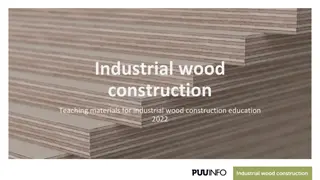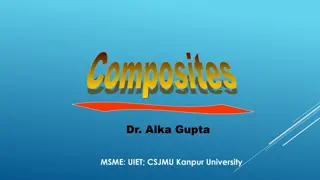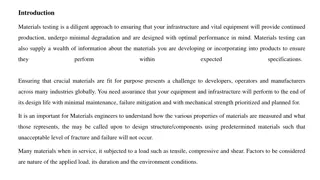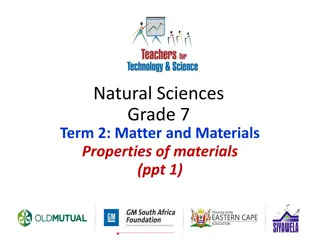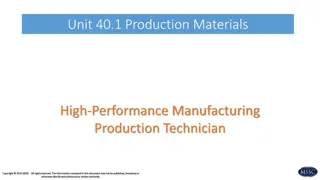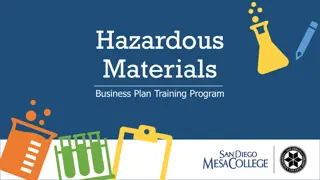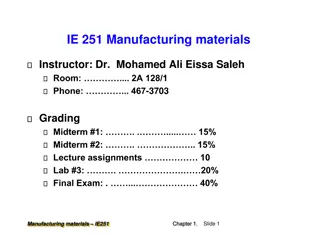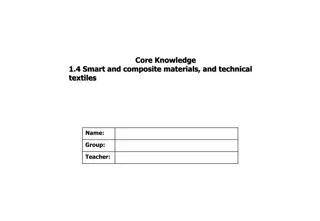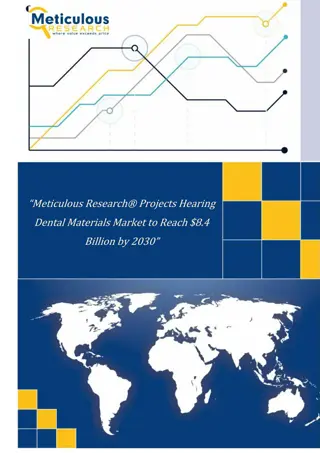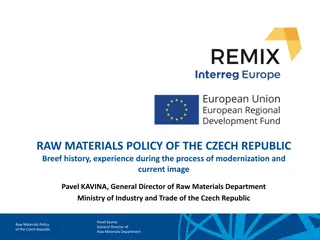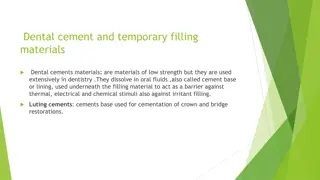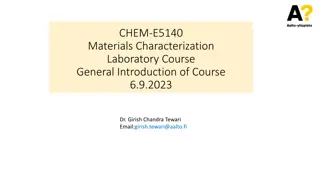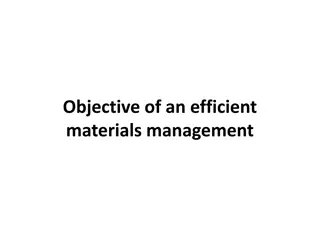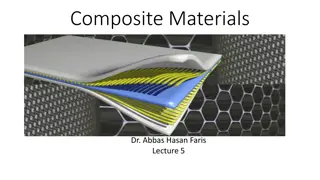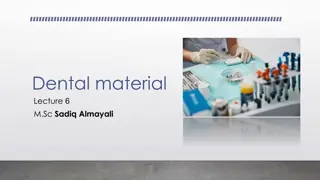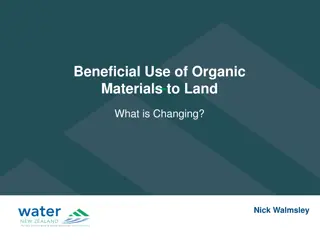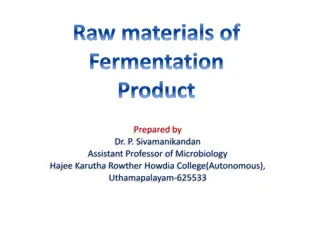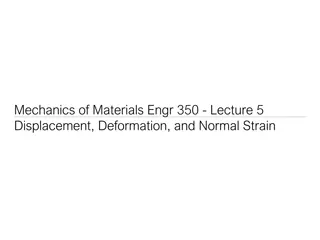Florida Statewide Assessments - Summer 2023 Overview
Training materials for the Summer 2023 Florida Statewide Assessments in Miami-Dade County Public Schools, focusing on test administration policies and procedures. The materials are based on the Spring/Summer 2023 Test Administration Manual and cover important information related to test administrati
0 views • 69 slides
Module C1:Material substitution.
Explore the concept of material substitution in the context of circular economy principles for energy storage. Understand the importance of material availability, limitations of secondary raw materials in energy applications, and classification of energy conversion and supportive materials. Discover
5 views • 16 slides
Comprehensive Industrial Wood Construction Education Materials for 2022
Extensive teaching materials for industrial wood construction education in 2022, prepared by various educational institutions and industry experts. The materials cover topics such as construction economy, project management, and specialized knowledge on wood construction. Students will gain insights
2 views • 32 slides
Significance of Raw Materials in Food Processing
Effective selection of raw materials is crucial for ensuring the quality of processed food products. The quality of raw materials directly impacts the final products, making it important to procure materials that align closely with processing requirements. Quality evaluation, including microbiologic
2 views • 30 slides
Understanding Dental Impression Materials and Techniques
Dental impression materials are essential in dentistry to create precise negative records of the oral tissues. The process involves obtaining a negative impression and then producing a positive reproduction using materials like dental stone. These materials must meet specific desirable properties to
1 views • 18 slides
Understanding Composite Materials: Properties and Applications
Composite materials are combinations of chemically distinct substances that offer improved properties over individual materials. They can be natural or synthetic, with examples like wood and bamboo. Composites consist of reinforcing fibers or particles embedded in a matrix material. Smart materials,
1 views • 9 slides
Understanding the Importance and Methods of Materials Testing
Ensuring materials in infrastructure and equipment meet performance standards is crucial for sustainable production. Materials testing, encompassing destructive and non-destructive methods, provides valuable insights into material properties. From tensile to compression tests, understanding stress a
4 views • 28 slides
Understanding Thermal Properties of Materials
Materials respond differently to heat based on their thermal properties such as heat capacity, thermal expansion, conductivity, and shock resistance. The ability of materials to absorb heat, expand with temperature changes, and conduct heat varies across ceramics, metals, and polymers. Heat capacity
0 views • 19 slides
Understanding Physical Properties of Materials in Grade 7 Natural Sciences
Exploring the physical properties of materials like strength and flexibility helps us decide which materials to use for specific purposes. Strong materials like steel and concrete are used in construction, while flexible materials like rubber and copper wire have different applications. Consideratio
1 views • 17 slides
Understanding Impact Testing for Materials Evaluation
Impact testing is crucial for assessing the toughness and resistance of materials to fracture under high-rate loading conditions. Charpy and Izod tests are common methods used to measure impact energy and evaluate materials' performance. The tests involve striking a specimen with a striker and measu
2 views • 13 slides
Engineering Materials and Production Techniques Overview
Learn about the various types of engineering materials used in high-performance manufacturing, including natural and synthetic materials. Explore the properties of materials, such as strength, conductivity, and resistance. Discover the different categories of metals, alloys, and polymers commonly ut
0 views • 19 slides
Hazardous Materials Business Plan Training Program
Facilities subject to the Hazardous Materials Business Plan (HMBP) Program must implement a training program for employees on hazardous materials safety and emergency response. This includes initial training for new employees within 30 days of hire and annual refresher training. Training covers safe
1 views • 73 slides
Materials Science: Revolutionizing Innovation in the Next Decade
Materials science is poised to be the cornerstone of technological advancements in the next decade, addressing challenges such as clean energy, product innovation, and material supply disruptions. Scientists are leveraging advanced simulation techniques and machine learning to accelerate materials r
2 views • 15 slides
IE 251 Manufacturing Materials Course Overview
Explore the impact of modern materials on daily products, understand engineering materials and their properties, and delve into classes of materials like metals, polymers, ceramics, and composites. The course covers topics ranging from atomic structure to phase transformations, emphasizing the role
0 views • 14 slides
Understanding Materials Science and Engineering Fundamentals
Materials play a crucial role in our daily lives, influencing everything from transportation to communication. This lecture delves into the historical significance of materials, the distinctions between materials science and materials engineering, and the importance of structure-property correlation
1 views • 25 slides
National Academy of Engineering and Materials Science Insights
The National Academy of Engineering (NAE) and National Materials and Manufacturing Board (NMMB) provide expert advice on pressing challenges, promoting a vibrant engineering profession, and advancing technology. The NMMB focuses on materials science for engineering innovations, offering independent
1 views • 13 slides
Exploring Materials in Everyday Objects
Discover the suitability of different materials for specific uses through fun activities like a spoon race with various spoon materials. Explore why certain materials are not appropriate for certain objects and engage in creative tasks like imagining a spoon made of tissue paper. Michael Rosen's whi
0 views • 6 slides
Exploring Smart and Composite Materials in Modern Technology
The content delves into the realm of smart and composite materials, highlighting modern advancements and applications such as shape-memory alloys, nanomaterials, photochromic glass, temperature-responsive polymers, and more. It discusses the advantages, disadvantages, and examples of composites like
0 views • 11 slides
University P-Card Approval Process for Marketing Materials
Explore the University P-Card approval process for purchasing marketing materials such as advertising, branded promotional goods, and operational/print items. Learn what items are considered marketing materials, who to contact for purchase, and the procedures for reconciliation. Find out how to buy
0 views • 10 slides
Dental Materials Market
The dental materials market is categorized based on type\u2014comprising Indirect Restorative Materials (metal-ceramics, ceramics, and other indirect materials), Direct Restorative Materials (amalgam, resin-based composites, glass ionomer, and other
0 views • 4 slides
Forest Service Policy on Native Materials in Wilderness
This information outlines the use of native materials in wilderness areas, focusing on trails, bridges, and administrative facilities. It covers examples of structures using native materials, common questions surrounding material choices, guidelines for trail and wilderness managers, and Forest Serv
0 views • 31 slides
Understanding Raw Materials in Ceramic Production
Raw materials play a crucial role in ceramic production, with three main groups identified - plastic materials like clay, non-plastic or leading mixtures such as silica, and fluxes/mineralizers like feldspar. These materials undergo various transformations during the manufacturing process, contribut
0 views • 29 slides
Raw Materials Policy of the Czech Republic: History, Modernization, and Challenges
The Raw Materials Policy of the Czech Republic has undergone significant changes and challenges throughout its history. From the approval of the previous policy in 1999 to the recent modernization efforts in 2015, political and environmental factors have played a crucial role in shaping the current
0 views • 13 slides
Understanding X-Ray Diffraction Techniques in Materials Science
X-ray diffraction (XRD) analysis is a crucial technique in materials science for determining the crystallographic structure of materials. By irradiating a material with X-rays and measuring their intensities and scattering angles, XRD helps identify materials based on diffraction patterns. This meth
0 views • 5 slides
Understanding Dental Cements and Temporary Filling Materials
Dental cements are essential in dentistry, acting as barriers against various stimuli and irritants. They can be classified based on different compounds and have specific applications such as root canal sealers and orthodontic bonding. Zinc phosphate cement is a common material used for lining, whil
0 views • 24 slides
Materials Characterization Laboratory Course Overview
Learning about material characterization in the CHEM-E5140 Materials Characterization Laboratory Course includes understanding physical and chemical properties of various materials, such as bulk, surfaces, and nanostructures. The course structure involves lectures, lab sessions, assignments, and end
0 views • 48 slides
Efficient Materials Management Strategies for Optimal Operations
Efficient materials management aims to ensure the right materials are available at the right place, time, quantity, and quality. It involves stages such as precise objective definition, specification of requirements, and measurement of performance. Factors influencing materials management include te
0 views • 20 slides
Understanding Types of Language Teaching Materials
Explore the various types of language teaching materials, including authentic and non-authentic materials, pedagogical resources, and created materials. Learn about the characteristics of authentic material and its advantages in language learning. Discover examples of authentic materials such as son
0 views • 22 slides
Evolution of Materials Science and Engineering in Human History
Explore the journey of materials in human history, from traditional ceramics to high-tech metal industry and beyond. Learn about the development of materials science and engineering, the different properties of materials, and the classification of materials into metals, ceramics, polymers, composite
0 views • 9 slides
Understanding Composite Matrix Materials in Engineering
Composite materials are made of reinforcing fibers and matrix materials, with the matrix serving to protect and enhance the properties of the composite. There are three main types of composite matrix materials: metal matrix composites (MMC), ceramic matrix composites (CMC), and polymer matrix compos
0 views • 22 slides
Dental Materials Overview and Standards
Dental materials play a crucial role in various dental procedures such as implants, onlays, crowns, and bridges. Different materials like titanium and ceramics are utilized, with standards set by organizations like the ADA, ISO, and FDA. Safety and quality assurance are vital for restorative dental
0 views • 10 slides
Understanding the Classification of Magnetic Materials
The origin of magnetism lies in the orbital and spin motions of electrons, determining the magnetic properties of different materials. All matter is magnetic to some extent, with substances exhibiting diamagnetism, paramagnetism, or ferromagnetism. Diamagnetic materials oppose applied magnetic field
0 views • 24 slides
Understanding Rheology in Dental Materials
Rheology is a crucial aspect in dentistry as it deals with the flow properties of various dental materials, including liquids like molten alloy and impression materials. Viscosity plays a key role, determining how materials flow and behave. Different fluid classifications based on rheology, such as
0 views • 15 slides
The Changing Landscape of Organic Materials Management
Explore the shift towards beneficial use of organic materials in land management as highlighted by the new guide developed to establish a consistent framework. The guide aims to address nutrient cycles, contaminants, and end-use by introducing quality criteria for environmental and public health pro
0 views • 16 slides
Raw Materials in Industrial Fermentation Processes
Microorganisms utilized in industrial fermentation require essential raw materials such as water, energy sources, carbon, nitrogen, mineral elements, and sometimes vitamins and oxygen. Various raw materials like cane molasses, beet molasses, cereal grains, starch, glucose, and lactose serve as carbo
0 views • 15 slides
Sustainable Building Materials Certification Guidelines
This document outlines the minimum requirements for Level 1 (Health) and Level 2 (Leadership) certification of building materials, focusing on GreenGuard Gold certification for various product categories including adhesives, flooring, paint, insulation, furniture, and wood products. Additionally, it
0 views • 4 slides
Understanding Flexoelectric Materials and Their Asymptotic Behavior in Crack Development
Explore the utilization of asymptotic approaches to analyze crack development in flexoelectric materials, considering the influence of intensity of applied stress, limitations, advantages, and the connection to singular perturbation methods. Discover the intriguing property of flexoelectric material
0 views • 17 slides
Understanding Insulating Materials for Energy Efficient Buildings
Insulating materials play a crucial role in maintaining energy efficiency in buildings. This presentation covers the classification of insulating materials based on solid structure nature - mineral, vegetal, and synthetic. It explores the properties and applications of different types of insulating
0 views • 41 slides
RIPA Technical Meeting Grand Rapids, MI
The Pipeline and Hazardous Materials Safety Administration's (PHMSA) strategic framework emphasizes innovation and safety in transportation of energy and hazardous materials. Goals include cultivating excellence, building trust, and pursuing operational excellence. Initiatives such as IBC repair tes
0 views • 11 slides
Understanding Displacement, Deformation, and Normal Strain in Mechanics of Materials
Displacement and deformation in materials play a crucial role when loads are applied, leading to normal strain. This lecture discusses the concepts of displacement, deformation, and strain, covering topics such as types of strain, strain units, normal strain calculations, and the orientation of norm
0 views • 7 slides


